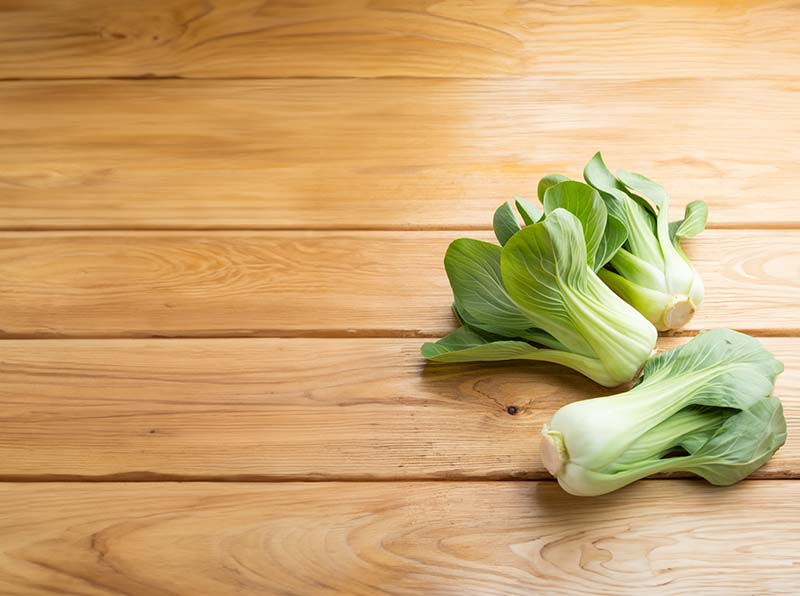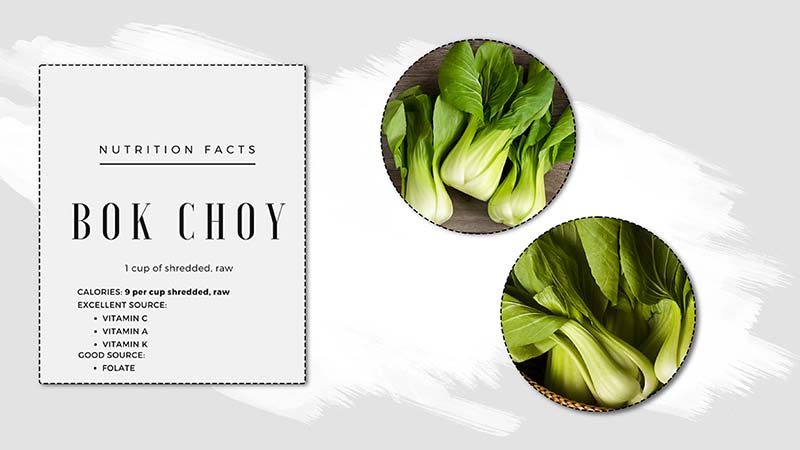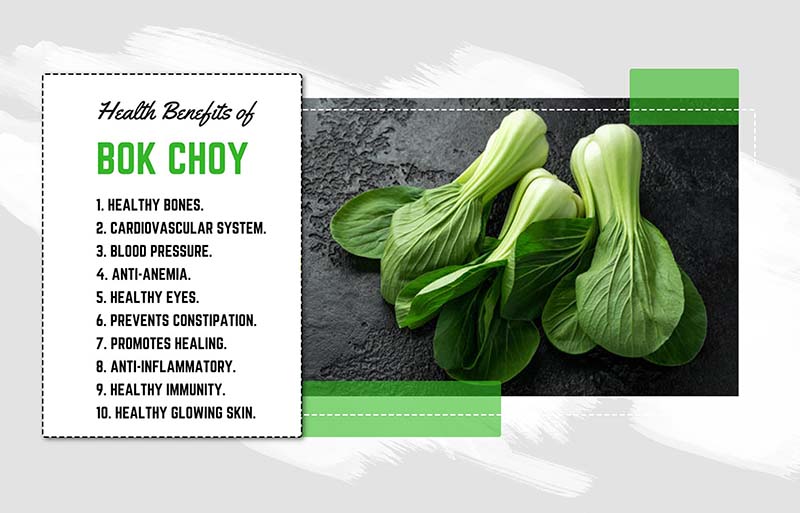Is Bok Choy Good for Weight Loss? Let’s find out! In the world of effective dieting, the real game-changer isn’t just about counting carbs or fats, but embracing greens like Bok Choy. While often overshadowed by spinach and kale, bok choy is a hidden gem for weight loss and enhancing overall health. Discover with us the surprising health benefits, nutritional facts, and unique qualities of Bok Choy, and see if it’s the key to revolutionizing your weight loss plan.

Is Bok Choy Good for Weight Loss?
Bok choy, a leafy green vegetable, is an ideal food for those on a weight loss journey. With only 13 calories per 100 grams and minimal fat, it’s an excellent choice for calorie-conscious diets. This nutrient-rich vegetable not only aids in weight management but also brings a wealth of health benefits. High in dietary fiber, bok choy is excellent for promoting satiety, which means you feel full longer, reducing the urge to snack on less healthy options. Research also indicates that bok choy can play a role in decreasing fat buildup in the body, offering another plus for weight management. Incorporating bok choy into a well-rounded diet is a strategic move for those focusing on weight loss.
Note: To maximize the benefits of bok choy, try steaming or lightly sautéing it. This preserves its nutrients and makes it a versatile addition to various dishes, from stir-fries to soups. Its mild flavor pairs well with various ingredients, offering both delicious taste and health benefits.

Nutritional Content of Bok Choy
A single cup of shredded bok choy, weighing around 70 grams, packs a nutritional punch with a mere 9 calories. This makes it an excellent choice for those mindful of their calorie intake. It contains 1 gram of protein, essential for muscle building and repair, and has zero fat, making it ideal for heart-healthy diets. In terms of carbohydrates, it’s quite low, with only 1.5 grams per serving, including 1 gram of natural sugars and 1 gram of fiber, aiding in digestion.
Bok choy is a powerhouse of essential minerals. It provides 6% of your Daily Value (DV) for calcium, crucial for bone health; 3% of the DV for both iron, key for blood health, and magnesium, which supports over 300 biochemical reactions in the body. Additionally, bok choy provides 2% of the DV for phosphorus (vital for teeth and bones), 4% for potassium (crucial for heart and muscle function), 1% for zinc (supports the immune system), and 5% for manganese (essential for brain and nerve function). Additionally, it offers 1% of your DV for selenium, an important antioxidant.
The vitamin content is also noteworthy. Bok choy provides a whopping 35% of the DV for vitamin C, vital for immune function and skin health; 12% for folate, essential for DNA synthesis and repair; 17% for vitamin A, important for vision and immune health; and 27% for vitamin K, crucial for blood clotting and bone metabolism.

Health Benefits of Bok Choy
Bok choy isn’t just a tasty and crunchy vegetable; it’s a nutritional powerhouse. Packed with fiber, vitamins, and minerals, this leafy green is a stellar addition to a health-conscious diet. Its abundance of antioxidants and beneficial compounds contributes significantly to overall wellness.

1. Potential Cancer Risk Reduction
Cruciferous vegetables like bok choy are known for their cancer-fighting abilities. They are rich in vitamins C and E, beta-carotene, folate, and selenium – all potent antioxidants. These nutrients help protect cells from damage by free radicals, potentially lowering cancer risk. Selenium, in particular, may slow tumor growth. Bok choy’s high fiber content also promotes a healthy digestive system, which is key in preventing colon cancer.
2. Promotion of Bone Health
For strong, healthy bones, bok choy is an excellent choice. It’s loaded with bone-strengthening nutrients such as calcium, phosphorus, iron, magnesium, and vitamin K.
3. Risk Reduction for Heart Disease
Bok choy contributes to heart health in several ways. It contains folate and vitamin B6, which help eliminate homocysteine, a compound that can damage blood vessels. Diets rich in leafy greens, including bok choy, are associated with a reduced risk of heart disease.
4. Enhancement of Eye Health
While carrots are often the go-to for eye health, bok choy is also beneficial. It’s a good source of vitamin A and beta-carotene, essential for maintaining eye health and potentially reducing the risk of age-related eye diseases.
5. Anti-Inflammatory Properties
Bok choy contains quercetin, a flavonoid known for its anti-inflammatory effects. Reducing inflammation can lower the risk of chronic diseases like heart disease, diabetes, and cancer.
6. Immune System Support
The selenium in bok choy boosts the immune system, enhancing the body’s ability to fend off harmful pathogens.
7. Blood Pressure Regulation
High in potassium, magnesium, and calcium, bok choy helps naturally regulate blood pressure. Adequate potassium intake, in particular, can counteract the effects of high sodium on blood pressure.
8. Support for Thyroid Function
As a good source of selenium, bok choy plays a vital role in thyroid health. Selenium is crucial for producing thyroid hormones and protecting the gland from oxidative stress.
9. Aid in Healthy Pregnancy
Folate is essential during pregnancy, and bok choy, a rich source of this nutrient, can help meet increased requirements, preventing complications like spina bifida and anencephaly.
10. Improvement of Skin Health
The vitamin C in bok choy fights free radicals, reducing skin damage from environmental factors. It also aids in collagen production, combatting signs of aging.
11. Treatment Support for Anemia
Rich in iron, bok choy is crucial for hemoglobin production in red blood cells, essential for oxygen transport. Adequate iron intake can prevent and treat anemia, marked by fatigue and weakness.
Notes: When preparing bok choy, remember that light cooking methods like steaming or stir-frying help retain its nutritional value. Its mild flavor makes it versatile in dishes, enhancing both taste and health benefits.
Allergic to Eating Bok Choy
Bok choy is generally safe and not known to cause allergies for most people. However, since it’s part of the same family as broccoli and cabbage, some people who are sensitive to these vegetables might also have a reaction to bok choy. This is especially true for those with Oral Allergy Syndrome (OAS), a condition where certain foods cause mouth itching, particularly in people allergic to mugwort pollen.
When you’re trying bok choy for the first time, it’s a good idea to eat just a little bit to see how your body reacts. If everything seems fine after a few times eating it, you can safely have more.
Note: If you’re someone who often gets food allergies, be cautious with new foods like bok choy. If you feel anything unusual after eating it, it’s best to talk to a doctor or a health expert.
Potential Adverse Effects of Bok Choy
Bok choy, a nutrient-rich vegetable, brings numerous health advantages, yet it’s important to be mindful of its potential drawbacks, especially when consumed in large quantities.
The presence of an enzyme called myrosinase in raw cruciferous vegetables like bok choy plays a key role. This enzyme interacts with glucosinolates, also found in these veggies, leading to certain by-products.
Interestingly, these by-products can potentially interfere with the absorption of iodine, crucial for maintaining healthy thyroid function.
Consider an unusual case: an elderly woman faced severe hypothyroidism and coma, landing her in intensive care. Her diet? A staggering 14–21 cups of raw bok choy daily for several months. This illustrates how extreme consumption can lead to health issues.
But, it’s worth noting that this is an isolated, extreme scenario. The risk of thyroid impairment typically emerges only with the excessive, prolonged intake of raw cruciferous vegetables.
Research regarding the specific thyroid-inhibiting effects of bok choy is limited. However, standard servings are generally considered safe and unlikely to impact thyroid function.
A key point to remember is that cooking bok choy deactivates myrosinase, essentially eliminating concerns related to thyroid function.
Note: Bok choy is also a significant source of vitamin K, essential for blood clotting. This raises a flag for those on blood-thinning medications like warfarin. A dramatic change in vitamin K intake can alter the effectiveness of these drugs.
To put it in perspective, a cup of chopped bok choy (about 70 grams) fulfills roughly 27% of your daily vitamin K requirement.
If you’re on blood clotting medication, it’s wise to consult your healthcare provider to understand how much bok choy fits safely into your diet.
In conclusion, regarding the question ‘Is Bok Choy Good for Weight Loss?’ it is clear that it’s an excellent choice for those aiming to balance a healthy diet with weight management. Its low calorie count, coupled with a high nutrient density, makes bok choy a valuable addition to any weight loss regimen. We’re keen to hear about your personal experiences with bok choy. Have you found it beneficial in your weight loss journey?
Feel free to share your stories and insights. And for more health and wellness tips, remember to check out additional blogs from MyahPhysician. Your journey to better health is a story worth sharing!

Marconi Abreu, M.D.
Internal Medicine – Endocrinology Type 1 Diabetes Type 2 Diabetes
Marconi Abreu, M.D., is a distinguished endocrinologist specializing in diabetes at UT Southwestern Medical Center, where he serves as an Associate Professor and the Medical Director of the Parkland General Endocrinology Clinic. With a medical degree from Universidade Federal da Bahia, Brazil, Dr. Abreu furthered his expertise in internal medicine and endocrinology at the University of Connecticut and UT Southwestern.
His clinical focus lies in Type 1 and Type 2 diabetes management, leveraging advanced technology to empower patients. Dr. Abreu also has a keen interest in reproductive endocrinology, adrenal, and pituitary disorders. His research contributions are extensive, including several journal articles and case studies, significantly advancing understanding in his field.
Outside of medicine, Dr. Abreu enjoys cooking, playing the guitar, traveling, and following the stock market. His multi-faceted approach to healthcare, combined with his varied interests, makes him a respected figure in the medical community, particularly in the areas of diabetes and endocrinology.
PUBLICATIONS
- Patel SM, Marconi A, et al. “Visual Vignette.” Endocrine Practice (2019).
- Abreu M, et al. “A Randomized Trial Comparing the Efficacy and Safety of Treating Patients with Very Elevated HbA1c Levels…” Diabetes, Obesity & Metabolism (2019).
- Carruthers D, Abreu M, et al. “Determining Insulin Dose at the Time of Discharge in a High-Risk Population…” Endocrine Practice (2019).
- Patel S, Abreu M, et al. “Effect of Medication Adherence on Clinical Outcomes in Type 2 Diabetes…” BMJ Open Diabetes Research & Care (2019).
- Custodio JS, Abreu M, et al. “SGLT2 Inhibition and Heart Failure-Current Concepts.” Heart Failure Reviews (2018).


